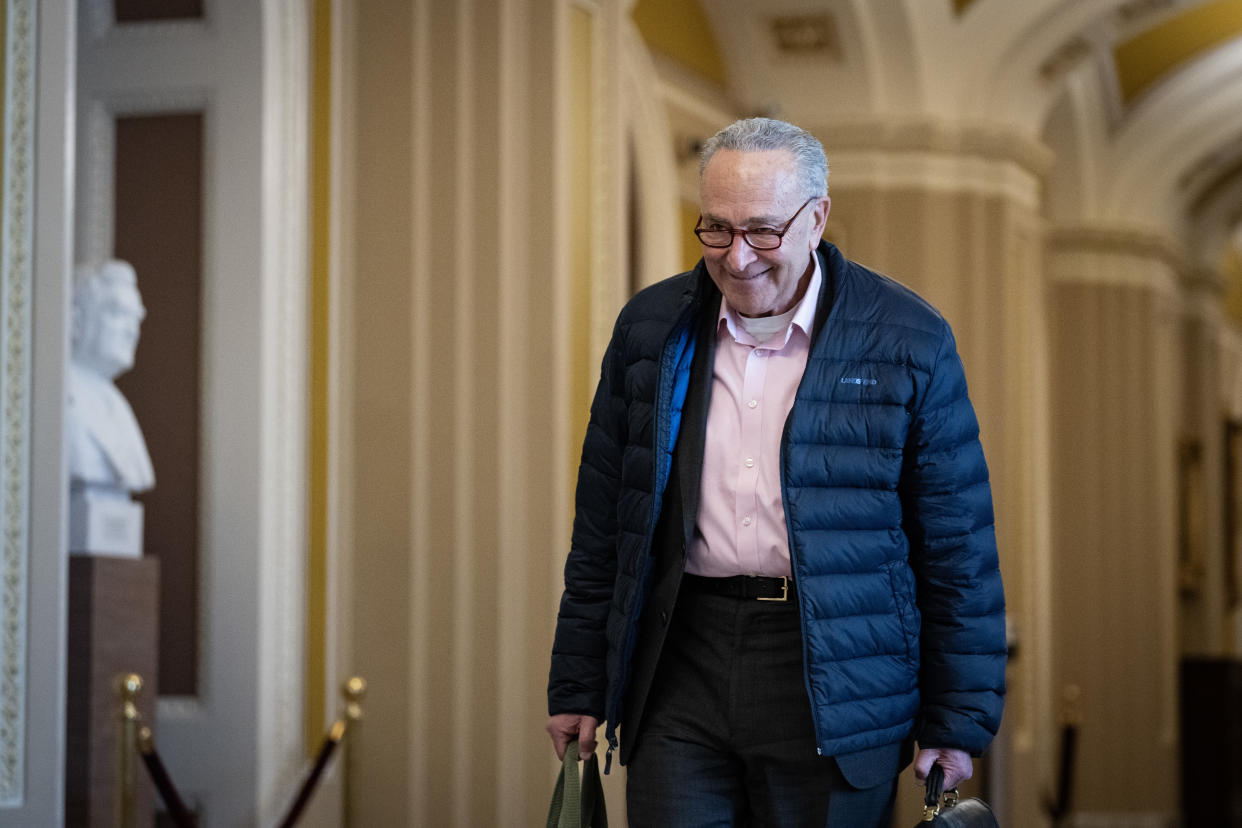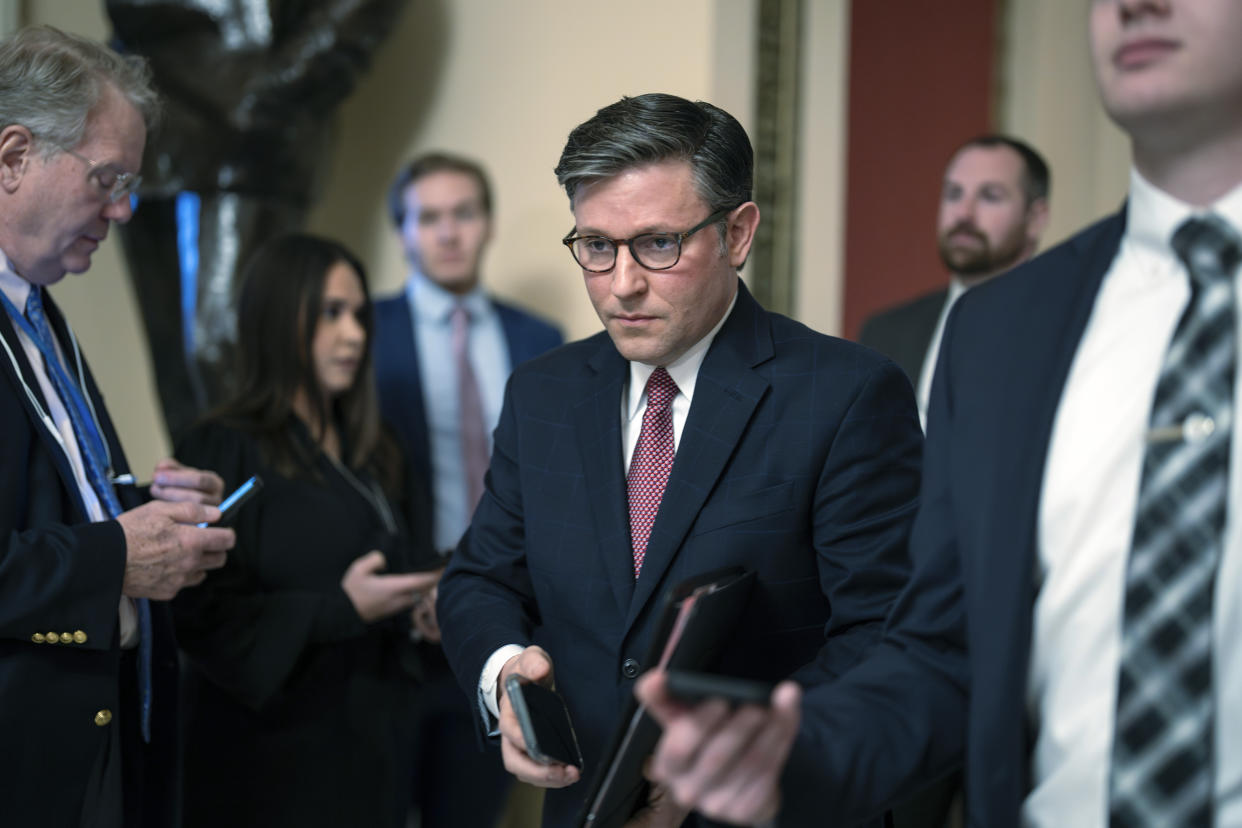A government shutdown this weekend remains a possibility despite Senate progress
The Senate began the process of averting a partial government shutdown this weekend, but it's not yet a sure thing that Washington will avoid at least a brief stoppage.
Laborious Senate rules and hard-line GOP opposition still stand in the way.
"Time is of the essence," said Senate Majority Leader Chuck Schumer (D-N.Y.) as he kicked off the voting process Tuesday for another short-term continuing resolution (CR). The Senate voted 68-13 on the initial motion to proceed on the bill.
"If both sides continue to work in good faith, I am hopeful that we can wrap up work on the CR no later than Thursday."

But good faith is not yet assured, with more than a dozen Senators voting no on Tuesday night and Senate rules giving any one of them the power to delay a final vote.
And even once that is done, House Speaker Mike Johnson will then have to navigate the bill through the House of Representatives and send it to President Joe Biden's desk before midnight on Friday.
In any case, the economic damage of a brief shutdown beginning Friday night would be negligible, especially if it's resolved before government offices reopen on Monday.
But another display of government gridlock could be a new strike for credit rating agencies who have again and again cited the dysfunction as a driving reason for their increasingly dim views of US creditworthiness.
Currently, Washington faces a partial shutdown on Jan. 19 that would close agencies like the Departments of Agriculture, Transportation, Energy, and others. That would be followed by a full shutdown on Feb. 2. The bipartisan plan is to delay those two deadlines while maintaining the "laddered" approach championed by Speaker Johnson.
The new deadlines would be March 1 and March 8.
Multiple points for GOP opposition
Getting the deal passed faces multiple bottlenecks ahead. First is in the Senate, where fast-tracking Schumer's package requires the consent of the entire Senate.
The 13 GOP Senators who opposed Tuesday night's measure included a range of prominent figures from Sens. Ted Cruz (R-Texas) to Rand Paul (R-Ky.) to J.D. Vance (R-Ohio). Any of them could potentially delay a final vote until the weekend.
The second potential roadblock is the House of Representatives, where Speaker Johnson has signed onto the bill but is facing pushback from his most conservative members. Some House Republicans want to tie a shutdown to parallel border policy negotiations with a refrain of "shut down the border or shut down the government."

Johnson has signed on to the deal and has been pushing his colleagues to get on board, saying that yet another delay is needed to give Republicans time to get policy wins in the overall appropriations process.
On Wednesday morning, Speaker Johnson again defended his approach from the critics, saying "we just need a little more time on the calendar" for Republicans to fight for their priorities.
But getting the bill through the House will be controversial, with the hard-right House Freedom caucus already making a strong push against the deal and calling it a "surrender."
Yet another level of complication is that top Congressional leaders, including both Schumer and Johnson, are set to visit the White House to meet with President Biden on Wednesday afternoon.
That meeting will officially be about the border and Biden's supplemental spending request for Ukraine and Israel. What remains to be seen is if shutdown considerations bleed into that back and forth, which is expected to be tense.
The procedural maneuver initiated Tuesday night by Schumer aims to take a bill that is already under consideration in the Senate — in this case, one to amend the Permanent Electronic Duck Stamp Act of 2013 — and use it as a legislative vehicle and replace its entire contents with the text of the shutdown resolution in the coming days.
How that process plays out could be closely watched by credit ratings agencies.
S&P made a call back in 2011 to downgrade the US credit rating after a wave of brinkmanship in that year's debt-ceiling fight. Last August, Fitch followed up with a downgrade of its own and cited government dysfunction as a key reason for doing so. Moody's made its own move in November, turning negative on the US but stopping short of a downgrade.
White House budget director Shalanda Young recently told reporters that her main concern around the shutdown fight is whether another wave of Washington dysfunction "will continue to play heavily in the minds of credit agencies as they continue to look at United States creditworthiness."
This post has been updated with additional developments.
Ben Werschkul is Washington correspondent for Yahoo Finance.
Click here for politics news related to business and money
Read the latest financial and business news from Yahoo Finance
